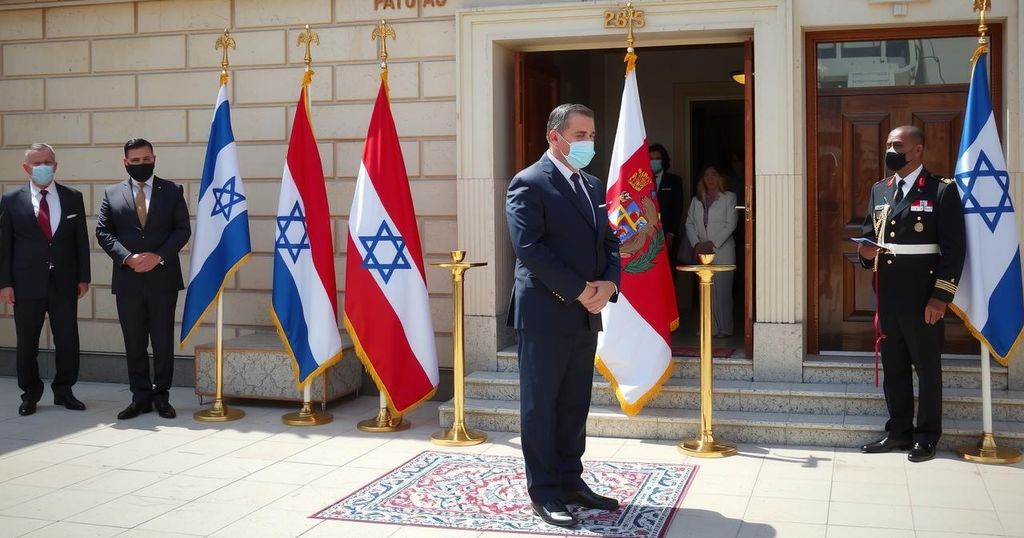Global news
ASIA, BENJAMIN NETANYAHU, BIDEN, CEASEFIRE NEGOTIATIONS, CONFLICT, DEVELOPMENT AID, GAZA, GAZA STRIP, HAMAS, HEZBOLLAH, HORACIO CARTES, HUMANITARIAN CRISIS, IRAN, ISRAEL, JOE BIDEN, LEBANON, NORTH AMERICA, OCEANIA, PAPUA NEW GUINEA, PARAGUAY, SOUTH AMERICA, SULLIVAN, UNITED STATES
Jamal Walker
0 Comments
Paraguay Reopens Embassy in Jerusalem Amid Shifting Middle Eastern Dynamics
Paraguay reopened its embassy in Jerusalem, reaffirming the city as Israel’s capital. This move follows its previous relocation in 2018, which was reversed shortly after under a new administration. President Santiago Peña’s action makes Paraguay the first country to establish an embassy in Jerusalem since the recent Hamas attack, joining a small group of nations with similar recognition. The geopolitical implications are significant amid ongoing U.S. negotiations concerning potential resolutions for conflicts in the region.
On Thursday, Paraguay officially reopened its embassy in Jerusalem, reaffirming its recognition of the city as the capital of Israel. This move positions Paraguay among a limited number of countries, including the United States, Honduras, Guatemala, Kosovo, and Papua New Guinea, that have established embassies in Jerusalem. Paraguay’s initial relocation occurred in 2018 under the leadership of then-President Horacio Cartes but was reversed shortly after a change in administration. The recent initiative by President Santiago Peña marks a significant diplomatic development, being the first such embassy opening following the October 7 terrorist attack by Hamas, which escalated tensions in the region.
In the backdrop of Paraguay’s diplomatic actions, the geopolitical landscape in the Middle East is undergoing considerable changes. President Joe Biden’s national security adviser, Jake Sullivan, noted that Israel’s ceasefire in Lebanon has opened channels for renewed negotiations aimed at resolving the ongoing conflict in Gaza. Sullivan indicated that Hamas’s approach at the negotiation table has adapted following recent military setbacks for its allies, particularly Hezbollah, which enhances the prospect of securing a more stable arrangement in the region. He expressed confidence in the potential for a successful conclusion to these negotiations amid shifting dynamics that favor Israel’s position.
The reopening of Paraguay’s embassy reflects a broader trend of nations reassessing their diplomatic ties with Israel, particularly in the wake of recent conflicts. This decision underscores the evolving perceptions of Israeli sovereignty over Jerusalem within international relations. As nations navigate the complexities of Middle Eastern politics, Paraguay’s renewed commitment may signal a potential shift in regional alliances and diplomatic strategies, especially following the recent military and political developments affecting key players, including Israel and Iran.
“We believe it puts us in a position to close this negotiation,” – Jake Sullivan.
“We are now faced with a dramatically reshaped Middle East in which Israel is stronger, Iran is weaker, its proxies decimated, and a ceasefire that is new and will be lasting in Lebanon that ensures Israel’s security over the long term,” – Jake Sullivan.
In conclusion, Paraguay’s reopening of its embassy in Jerusalem is a noteworthy diplomatic gesture affirming the country’s stance on Israel’s capital. This development occurs amidst a reevaluated geopolitical landscape in the Middle East, where Israel’s standing appears to be strengthening after recent conflicts. As diplomatic dialogues intensify, the implications of altered relationships, particularly in relation to territories like Jerusalem, are likely to be pivotal in shaping future regional dynamics.
The reopening of Paraguay’s embassy in Jerusalem signifies a critical diplomatic recognition of the city as Israel’s capital. Paraguay’s previous relocation of its embassy in 2018 was quickly reversed, indicating the volatility of international diplomatic relations influenced by domestic changes. The reestablishment of the embassy under President Santiago Peña comes at a time of heightened tensions following the October 7 attack by Hamas, which underscores the complexities and consequences of Middle Eastern diplomacy post-conflict. This development follows broader geopolitical contexts, including shifts in U.S. policy and regional security discussions involving prominent stakeholders such as Iran and Israel.
The reopening of Paraguay’s embassy in Jerusalem not only reaffirms the country’s commitment to recognizing the city as Israel’s capital but also reflects the shifting dynamics in Middle Eastern geopolitics. With its timing following significant military confrontations, this decision may signal broader implications for international relations and regional stability. The comments from U.S. officials suggest an increasingly favorable environment for Israel in current negotiations, which could result in long-lasting changes in the Middle Eastern diplomatic landscape.
Original Source: www.reviewjournal.com




Post Comment